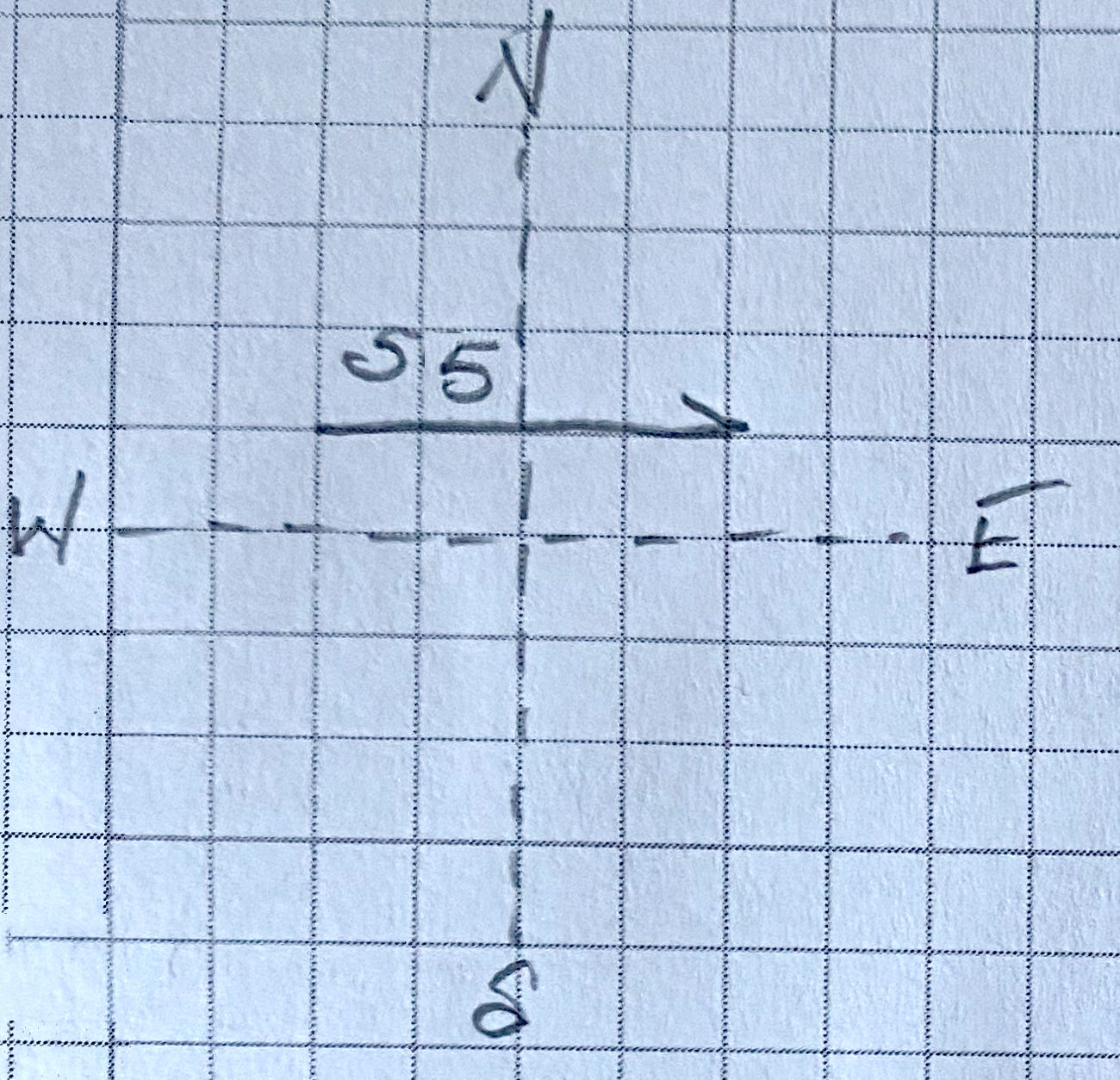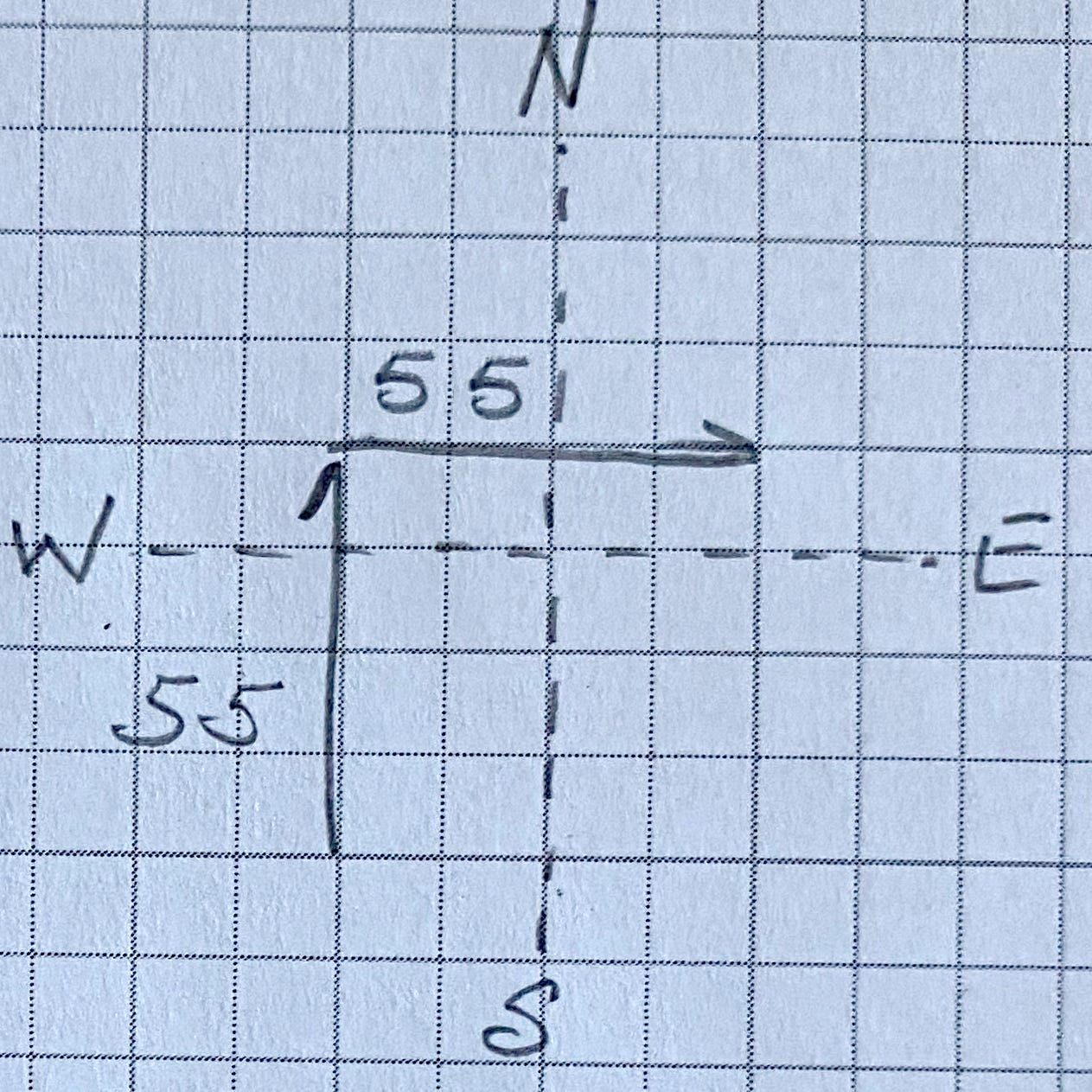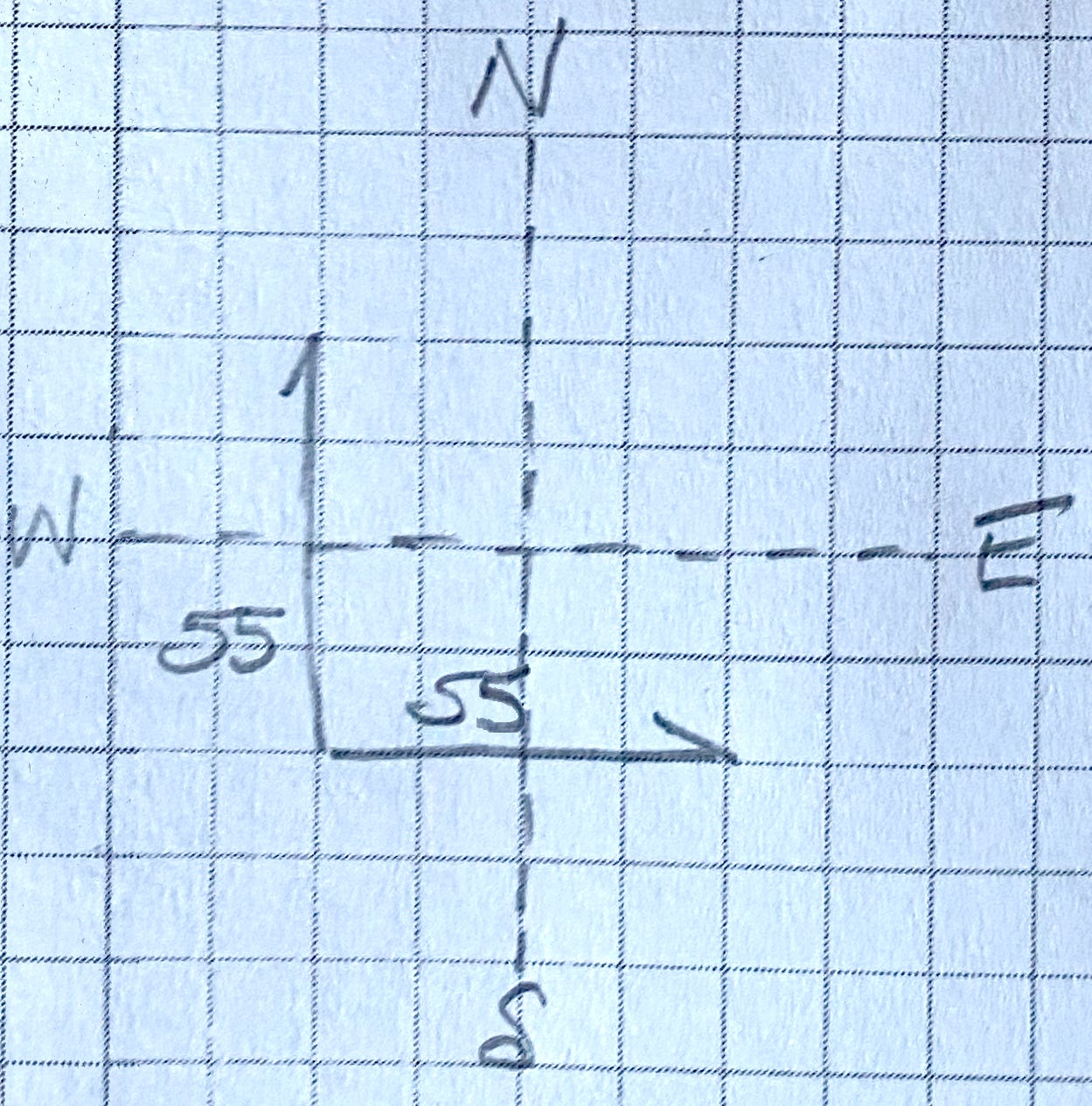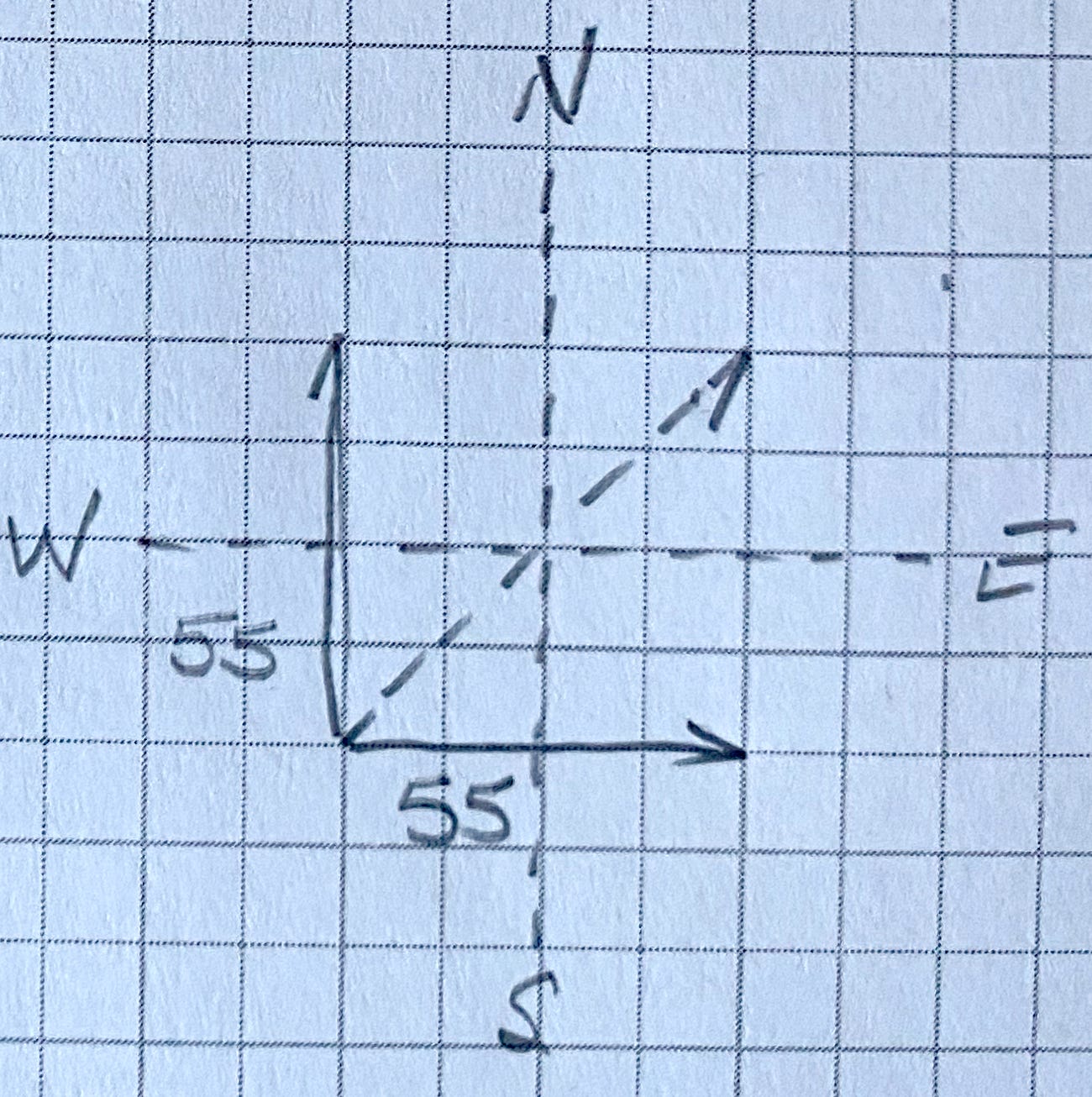Nothing says welcome back after a month-long absence like everyone’s favorite subject: mathematics. Bear with me; I’m headed somewhere.
Let’s talk about vector arithmetic. Seriously, stick it out. We’re only going to splash around in the kiddie pool—you’ve nothing to fear.
I get the same dopamine hit from vectors that I think most non-math people get from introductory geometry. The material is simple and intuitive and makes you feel like you’re really cooking—the same way cracking an egg into a box of cheap cake mix does.
“Vector” sounds like something fighter pilots and space captains say a lot, but it’s really just a combination of two measures: magnitude and direction. It’s perhaps best understood by thinking about a common application: measuring velocity. Velocity is often used as a synonym for speed, but if you’re being precise, velocity also includes direction. If you’re driving 55 mph, that’s your speed. If you’re driving east at 55, that’s your velocity, which may or may not be bad news if you’re on a one-way street with a cop behind you.
Like all things mathy, we gan get some graphs up in here. Here’s our ambiguously compliant driver:
Now, I mentioned arithmetic a while back. Turns out vectors can be added. (They can also be subtracted and multiplied and all sorts of other things but we’ll stick with addition for now.) Let’s stipulate that while you’re cruising east at double-nickels on the dime, you get t-boned by a passed-out drunk. We’ll dispense for a moment with friction and gravity and really anything other than these two cars and their motion vectors. The drunk, recall, is passed-out; he doesn’t slow down after the collision. Looks like this:
What’s the resulting vector? You can probably already intuit the answer, but we bought the graph paper, let’s use it. So remember that vectors are a measure of direction and magnitude. Their position on the graph is more or less arbitrary. We can move them around if we like:
It should be pretty obvious at this point what the resulting vector will be:
The direction is the average of the two contributing vectors. The speed is actually the hypotenuse of a right triangle with two sides measuring 551—not as obvious but you could probably eyeball it with reasonable accuracy.
Vectors are just the thing for calculating forces as well, which leads to a kind of black magic for predicting the future. Don’t believe me? Consider a spacecraft bound for Mars2. The Earth is at point A; Mars is at point B; both are in elliptical orbits of differing periods. Which direction do you point the rocket? And how fast do you need to fly in order your path to intersect that of Mars at some point nine months from now?
Of course the calculations for going to Mars are more complicated since you can’t just ignore the gravitational forces acting on the spacecraft and the effect of its continually changing mass as it burns through its fuel. But there are vectors in those calculations3, and you can perhaps now get a glimpse of the kind of legerdemain that can spring from the mind of a determined individual with a slide-rule.
Armed with this knowledge, let’s now exercise the prerogative of literature and baldly prize a possibly helpful but highly fuzzy metaphor from the cold precision of mathematics and ask how vectors might be brought to bear in our current political turmoil.
I’m no seer, but I am occasionally asked my opinion about the direction of the country or some portion thereof, I guess because of my habit of continuing to obsessively amass reams of horrifying information even as many recoil from the news as one would from a human-sized maggot or a sentient pile of shit. That and perhaps as well because I am characterologically disposed to seek out historical analogies for every passing event, as though knowing history with roughly the necessary acuity to win an average bar trivia contest which doesn’t entail any knowledge of pop music is in fact the equivalent of owning a crystal ball.
I have, over my half-century plus, it is true, freighted my head with all manner of absurd historical bric-a-brac. Take the story of John Bradmore, the English surgeon/blacksmith who saved the future King Henry V, afflicted with an arrow to the face at the tender age of 16 at the Battle of Shrewsbury in 1403—thus allowing him to pointlessly annihilate the cream of the French aristocracy at Agincourt twelve years later, an event leavened by the wonderful speech Shakespeare put in Henry’s mouth a couple centuries later. Of what purpose is this information? What does it say about the next federal bureaucracy Elon Musk and his gang of wilding teenagers is going rape next?
Very little, I suppose, though it certainly sheds some light on how we got here: human beings are cursed with ambition and lust for power. Call it Fletcher’s Law. This is as constant as hurricanes and floods, and it’s a useful rebuke to the rube who dares utter the stupidest words in the English language: It can’t happen here. The fuck it can’t.
Nonetheless, I, like you, want an answer. If not for those who desire my opinion, for myself. I must admit that all of that fragmentary and arbitrary historical knowledge mainly serves to increase my confusion and anxiety. Moreover, I’m as much a victim of recency bias as anyone—our society as a whole reaches back instinctively to the Third Reich and the Second World War, and why not? Those events still cast a long shadow over the present and if they don’t provide a roadmap, they provide a measure of magnitude—a still-flickering human memory of how bad things can get.
The truth is that no historical narrative is useful if you’re looking at it as a program of events. A trove of historical knowledge can give you a set of patterns for how, say, a coup might unfold, but it will never tell you how one will unfold.
The future is a product of all the forces at work in the present. In sum these forces are obviously much too complex to represent on a graph, no matter how dense the squares and how sharp the pencil lead. And of course there are countless unknowns.45 But at the moment we’re living largely in complete darkness. We can think of a vector analysis as a flashlight. A small one, with a narrow beam, but it’s not nothing.
I’m not going to wave that flashlight around this week—I think I’ve already asked more of you, dear reader, than one should be expected to put up with here in the late stages of late-stage capitalism, but I’ll share with you my delight that next week’s Red Clay Bestiary is already half-written. I don’t know what got into me during my last trip to Pour Taproom—my office outside the office.6 Perhaps it was the beer but the words you’re reading here are but a portion of what I put on the page. I cut all the parts about calculus.7 You’re welcome.
So next time up I’ll go through all the major players in this most inane of all dramas8 and take a stab at discerning which direction each of them is pushing and what the sum of those forces might add up to. I don’t think I have much hope of clearing away the fog of war that lies thick over the map of our future, but I do believe that approaching the matter with rational tools might offer ideas about where best to apply not only institutional counter-forces, but individual efforts as well, which is after all where most of us live.
Until then, stay strong, take solace in whatever scraps of nature and/or meaningful work come your way, and I’ll see you in a fortnight.
70.7 and change.
With Elon Musk hogtied in the boot.
And a smidge of calculus, to be fair.
Known and unknown, to cop a phrase from perhaps the only war criminal/game designer in American history.
Churchill Solitaire doesn’t expunge Rumsfeld’s criminality, but it’s actually a goddamn great card game that rewards, unlike most solitaire games, actual skill.
Free advertising: https://pourtaproomatlanta.com. But if you see me there with my pen in hand and my head down, say hi and move it along.
Except footnote #3. Sorry.
Who in Trump’s circle would get the big soliloquy in Shakespeare’s Donald I? None them possess even the subtlety of a fart; loading a heap of iambic pentameter into the mouth of J.D. Vance would be like shoving a trumpeter swan up your ass.








There’s a push going around to send a million postcards to Dump telling him anything we feel might get under his thin skin. Every one who writes one is to mail it on March 15. The Ides of Trump. Petty personal insults are fine. This is a world wide effort.